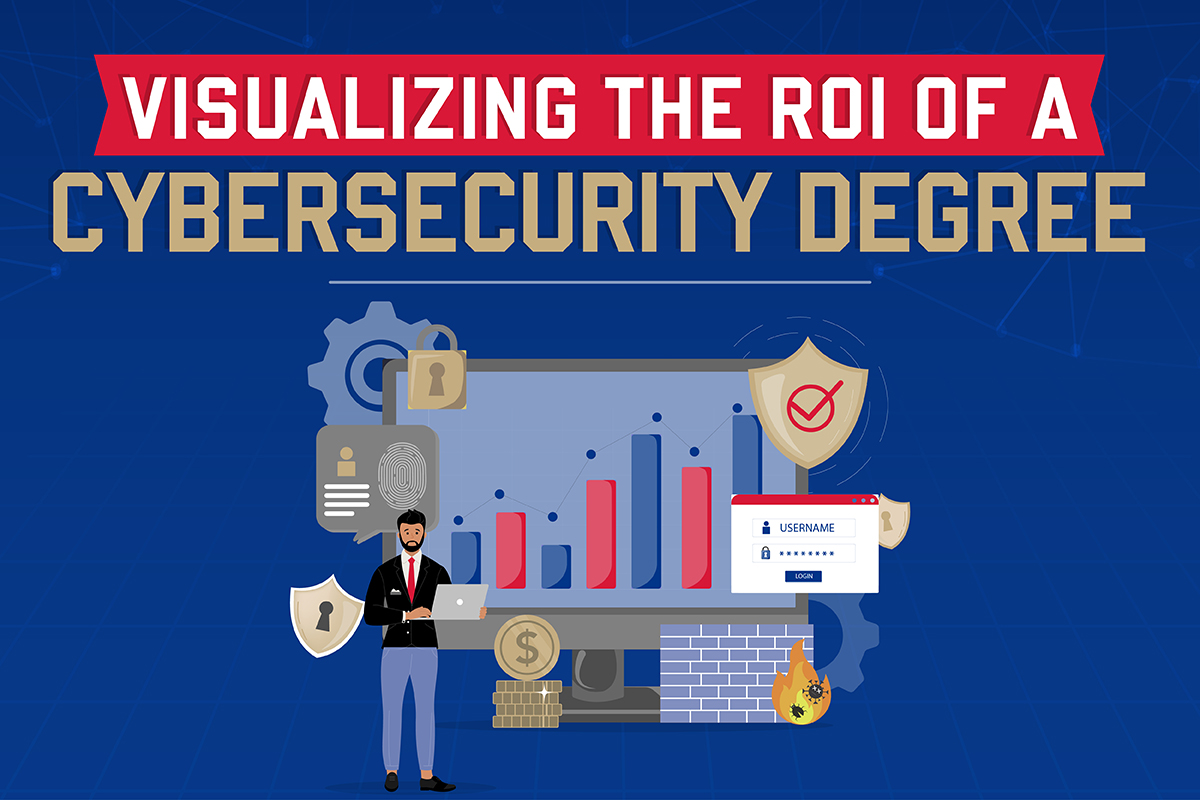Tips and Resources for Veteran Cybersecurity Training
Written by:
University of Tulsa
• Jan 22, 2024

Private businesses, government agencies, and other organizations depend on cybersecurity professionals to protect sensitive information and secure computer networks. Cyber terrorism also poses a critical threat to national security. Many employers, including the federal government, see veterans as top candidates for cybersecurity careers.
In the world of cybersecurity, threats and adversaries evolve rapidly. Cybersecurity professionals leverage security tools, network security methods, and incident response techniques to prevent data leaks, investigate cyber threats, and analyze cyber intelligence.
Military service prepares veterans for careers safeguarding private data and protecting networks from cyber attacks. Accessing resources on veteran cybersecurity training and earning an advanced degree in cybersecurity can help veterans launch a career in the in-demand field of cybersecurity.
Cybersecurity Career Outlook
Veterans who train for cybersecurity jobs benefit from a strong career outlook. Over 570,000 cybersecurity jobs remain unfilled in the U.S., according to the National Initiative for Cybersecurity Careers and Studies (NICCS), an initiative from the U.S. Department of Homeland Security (DHS).
In addition, demand for cybersecurity professionals will grow over the next decade. Information security analysts will see 32% job growth from 2022 to 2032, according to projections from the U.S. Bureau of Labor Statistics (BLS).
The cybersecurity field also reports high median salaries. Information security analysts earned a median pay of $112,000 in May 2022, according to the BLS.
Veteran Cybersecurity Training Resources
How can veterans upskill to enter the field of cybersecurity? Fortunately, veterans qualify for many training resources to build the knowledge and technical skills for careers in cyber defense, cyber intelligence, and information security.
The following resources can help veterans learn more about cybersecurity careers and prepare for roles in this in-demand field:
- Cyber Career Map: Created by the Cyber Center of Excellence (CCoE) and the state of California, the Cyber Career Map offers skills assessments, resources, and tools to launch a career in cybersecurity.
- National Initiative for Cybersecurity Careers and Studies: NICCS offers cybersecurity training, education, and career information. In addition to cybersecurity resources, NICCS offers free online training for veterans and an education assistance program.
- Federal Virtual Training Environment: Managed by the Cybersecurity and Infrastructure Security Agency (CISA), FedVTE offers veterans free access to online cybersecurity training. The program offers over 60 courses, from the beginner level to the advanced level, to build cybersecurity knowledge and skills.
- Cybersecurity Apprenticeship Program: DHS offers an apprenticeship program that provides hands-on experience. DHS also runs an internship program and offers resources for veterans seeking careers in homeland security.
- Information Technology Laboratory Veteran Resources: The Applied Cybersecurity Division (ACD) of the Information Technology Laboratory, a federal research laboratory, provides education and career resources for veterans pursuing careers in cybersecurity.
- CyberCorps Scholarship for Service Program: Co-sponsored by DHS, this scholarship program provides up to three years of funding for undergraduate or graduate studies. Recipients agree to work for the U.S. government after finishing their program.
Most colleges and universities also offer resources and support for veterans, including education benefits.
4 Tips for Veterans Interested in Cybersecurity Careers
Preparing for a career in cybersecurity requires a strategic approach. While some veterans can enter the field after completing a professional certificate or boot camp, many roles require a cybersecurity degree.
Successful veteran cybersecurity training starts with a strong plan. By planning ahead, veterans may be able to use their education benefits to cover the cost of a degree.
1. Research Career Paths
Veterans benefit from researching cybersecurity career paths before beginning a training or degree program. By learning more about the job requirements and focus areas, veterans can find the program that best fits their goals.
Within the field of cybersecurity, professionals specialize in many fields. For example, cyber threat intelligence analyzes information to detect and prevent cyber attacks. Veterans with a background in military intelligence may thrive in this specialty. Similarly, veterans are well positioned to work in cybersecurity defense.
2. Maximize Military Experience
Experience in the military gives many veterans a head start on cybersecurity training. Service members learn how to analyze information, solve complex problems, and follow security procedures. Holding a security clearance can also make veterans attractive candidates for federal cybersecurity careers.
Veterans can also reach out to the U.S. Department of Veterans Affairs (VA) to learn more about training programs, cybersecurity careers, and education benefits.
3. Leverage Veteran Financial Assistance Programs
Veterans qualify for several forms of financial assistance, including the GI Bill Yellow Ribbon Program. These benefits can potentially cover the cost of a cybersecurity degree.
In addition to contacting the VA about education benefits, veterans should reach out to the VA offices at universities to learn how to leverage financial assistance programs for veterans.
4. Build a Professional Network
While training for cybersecurity careers, veterans also need to build a professional network. Connecting with other cybersecurity professionals can open doors and better position candidates for the job market.
Veteran-centered networking groups and cybersecurity professional organizations often host events and offer networking opportunities. For example, VetSec, a nonprofit with 6,500 members who are veterans in the cybersecurity industry, provides training, mentoring, and networking resources. Similarly, veterans can leverage the career center at their university to expand their professional network.
Earn Your Master’s in Cyber Security Online at The University of Tulsa
Gain advanced technical skills in the online Master of Science (M.S.) in Cyber Security program at The University of Tulsa. In the 30-credit program, graduate students customize the curriculum by choosing between technical and leadership tracks. Complete the program in as little as 20 months to prepare for careers at federal government agencies, in law enforcement organizations, or the private sector.
The National Security Agency (NSA) and DHS recognize TU as a Center of Academic Excellence in Research and Cyber Defense Education. Veterans receive one-on-one support in accessing benefits, as well as access to the Veterans Center.
Recommended Readings
8 Reasons Demand for Cybersecurity Professionals Will Keep Rising
Information Security vs. Cybersecurity: What’s the Difference?
The Importance of Cybersecurity Leadership
Sources:
Cyber Center of Excellence, Welcome to the Cyber Career Map
National Initiative for Cybersecurity Careers and Studies, Cybersecurity for Veterans
National Initiative for Cybersecurity Careers and Studies, NICCS Veterans User Guide
National Institute of Standards and Technology, Veteran Resources
U.S. Bureau of Labor Statistics, Information Security Analysts
U.S. Department of Homeland Security, Cybersecurity Apprenticeship Program
U.S. Department of Veterans Affairs, Creating Career Pathways for Cyber Professionals
U.S. Office of Personnel Management, CyberCorps Scholarship for Service


